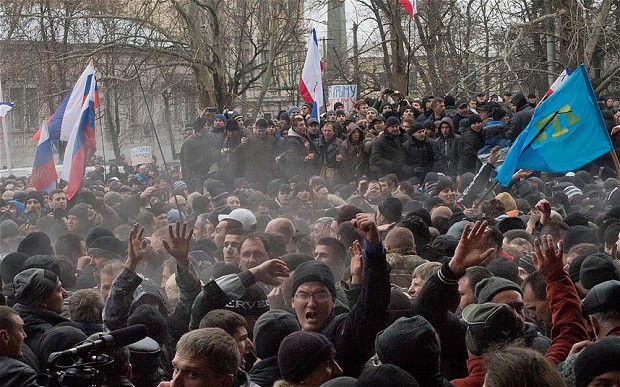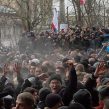
Overnight Crimean Crisis Hits Stalemate
Publication: Eurasia Daily Monitor Volume: 11 Issue: 39
By:

As of at least Friday, February 28, unmarked Russian tanks are reportedly moving through the streets of Simferopol, the administrative capital of Crimea (https://guzei.com/online_tv/watch.php?online_tv_id=4919). The crisis situation on this Ukrainian peninsula, populated by majority ethnic Russians, has been escalating for the past several days. On the morning of February 27, at 4:27 a.m., around 50–100 gunmen with masks, bags of ammunition, Kalashnikovs, sniper rifles and grenade launchers occupied the Crimean Parliament and the building of the Council of Ministers, and hoisted the Russian flag from the tops of both buildings. According to eyewitness accounts, they arrived in the area on buses and executed a well-designed plan to seize the buildings. Meanwhile Russian tanks became visible on the streets of Simferopol (https://odessit.in.ua/news/ukraine/v-zahvachennoe-zdanie-parlamenta-krima-vnesli-avtomati-kalashnikova–snaiperskie-vintovki-i-granatometi—ochevidec/). According to Crimean residents, people were told stay at home, and government institutions, schools and universities were closed (Author’s interviews, February 27).
While the gunmen prevented anybody from entering the building, the Crimean legislature held an extraordinary session that was supposed to have taken place the day before, but had been impeded by a mass rally of Crimean Tatar protesters gathered in front of the parliament. When Anatoly Mogilev, the chairman of the Crimean Council of Ministers, came out and tried to reason with the gunmen, they reportedly told him to go inside and wait. Most of the occupiers were wearing orange and black ribbons, which became a symbol of anti-Maidan protesters within the last months. In the morning, it became clear that the Crimean Parliament had dismissed Anatoly Mogilev from his post (https://www.pravda.com.ua/rus/news/2014/02/27/7016540/), and replaced him (by 53 out of 100 votes) with the chairperson of the Russian Unity party Sergei Aksyonov, a pro-Russian, anti-Tatar chauvinist politician who declared that he only recognizes Viktor Yanukovych as the president of Ukraine (https://15minut.org/article/novyj-premer-kryma-aksenov-budet-podchinjatsja-janukovichu-2014-02-27-21-43-35) and that he was going to work only with Yanukovych and with Russia to turn Crimea into a truly attractive place to live (https://15minut.org/article/na-golosovanii-v-krymskom-parlamente-ne-bylo-i-poloviny-deputatov-2014-02-27-20). The parliament also decided that Crimea would hold a referendum on May 25 on the peninsula’s sovereignty. Meanwhile, hundreds of pro-Russian demonstrators assembled in front of these areas and cheered while Soviet marching music played through megaphones.
In an interview with journalists, the speaker of the Crimean parliament, Vladimir Konstantynov, claimed that on Wednesday, February 26, “radical” forces—meaning the Crimean Tatars—prevented the extraordinary session that was going to decide on Crimea’s future (Zaman News, ATR television channel, February 26). That Wednesday, under the slogan of “Preserving the territorial integrity of Ukraine,” Crimean Tatars arrived in the thousands—including women and the elderly—carrying Ukrainian and Crimean Tatar flags and chanting “Glory to Ukraine,” “Glory to the heroes” (for the 82 who died during the Maidan protests in Kyiv), “Down with the Gang,” and “Crimea—not Russia” (https://www.pravda.com.ua/news/2014/02/26/7016325/).
The Crimean Tatars’ motivation to attend this rally organized by the Mejlis (the de-facto representative body of the Crimean Tatars) was to suspend the extraordinary session that the Crimean parliament was preparing to hold at 3 p.m. on Wednesday. At this session, the members of the Crimean parliament were planning to discuss two questions: “The political situation in Ukraine,” and “The situation of the Council of Ministers of Crimea.” In effect, the local Crimean legislators were planning to declare the newly forming government in Kyiv as illegitimate and ask for Moscow’s help to secede from Ukraine and to unify with the Russian Federation.
After the Crimean Tatars gathered, pro-Russian groups soon also arrived in the area under the leadership of Aksyonov—who would be named the new chairmen of the Crimean Council of Ministers the following day. Aksyonov’s group, which eventually numbered 2,000–3,000, included the Crimean Cossack Union—“Crimean Front” (these so-called Cossacks, in reality have nothing to do with the real Cossacks, but are simply pro-Russian, retired military officials living in Crimea), the “People’s Liberation Movement,” and “Union Taurida” (Taurida was a Tsarist Russian administrative district that included modern-day Crimea). They were carrying Russian flags and cheering “Glory to Russia” (https://qha.com.ua/militsiya-pokinula-kordon-mejdu-mitinguyuschimi-tatarami-i-russkimi-133580.html). Scuffles eventually broke out between the two opposing groups, which sent 30 people to the hospital and resulted in two deaths (https://interfax.com.ua/news/political/192976.html; https://15minut.org/article/miting-vozle-verhovnogo-soveta-kryma-prjamaja-transljacija-2014-02-26-11-34-11). After the rally, everybody returned home. Refat Chubarov, the newly elected head of the Mejlis, declared, “Today Crimea won”; but he obviously could not guess what the night was going to bring.
On the evening of February 26, Simferopol Airport (the only international airport in Crimea) was occupied by unmarked airplanes carrying military personnel, thought to be Russian special forces (https://15minut.org/article/ajeroporty-simferopolja-i-sevastopolja-zahvatili-2014-02-27-22-52-21). The Belbek military airport near Sevastopol was also blocked by ten “Ural” trucks belonging to the Russia Black Sea Fleet (BSF) forces (https://society.lb.ua/accidents/2014/02/28/257528_aeroport_simferopolya_zahvachen.html).
That same day, the BSF accepted an extra 11,000 Russian paratroopers to Sevastopol—where the Russian fleet is based according to a bilateral agreement with Ukraine that does not expire until 2042 (https://news.allcrimea.net/news/2014/2/26/korabli-chf-rf-privezli-v-sevastopol-11-tysyach-desantnikov-5856/). Furthermore, a delegation from the Russian Federation arrived in this strategic port city. Among them were deputy speaker of the Russian Parliament, Vladimir Vasiliev; State Duma member and the first female Cosmonout of Russia, Valentina Tereshkova; as well as other Russian parliamentarians and members of the ruling United Russia party (https://vgolos.com.ua/news/u_krymu_vzhe_perebuvaie_delegatsiya_z_rosii_136574.html).
“This is a beginning of a civil war,” warned Leonid Pilunsky, a deputy of the Crimean Supreme Council. “In the [past] 22 years of the existence of the Ukrainian state, men armed with machine guns never occupied a state administration building. This is terrorism. Are these gunmen the voluntary self-defense units protecting Russian interests in Crimea? Nobody knows,” argued Pilunsky, a Ukrainian politician from the Qurultay-Rukh faction, which is supported by Crimean Tatars (https://www.segodnya.ua/regions/krym/vse-podrobnosti-sobytiy-v-krymu-vooruzhennyy-zahvat-pravitelstvennyh-zdaniy-i-oglashenie-referenduma-499329.html).
On February 27, Mejlis head Chubarov addressed the Crimean Tatars on television and advised them to keep calm during these turbulent times. “Tomorrow, [national] Rukh Party deputies are arriving from Kyiv,” he said, “and soon, we will get help from international organizations…” (ATR, February 27). Nevertheless, the presence of Russian tanks and military personnel on the streets, armed men occupying government buildings, as well as seized airports could not help but remind many Crimean Tatars of the deportation their nation suffered 70 years earlier. On May 18, 1944, they were forced onto cattle cars by thousands of Soviet soldiers and armed security personnel, and 46.2 percent of them died while being transported to Central Asia (Justin Burke et al., Crimean Tatars: Repatriation and Conflict Prevention, New York: The Open Society Institute, 1996). It is thus no wonder how vehemently the Crimean Tatars now reject any plans for their homeland of Crimea to return to Russian rule.




